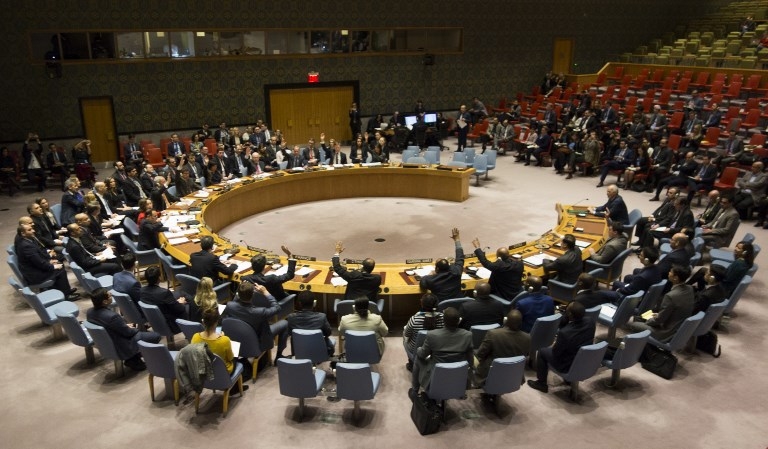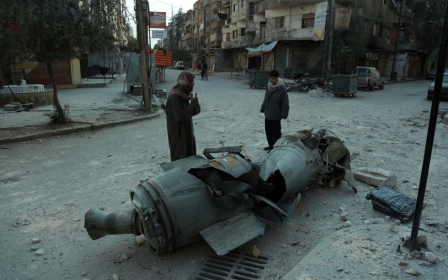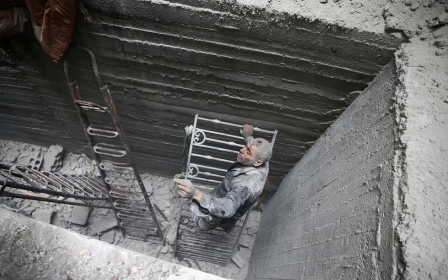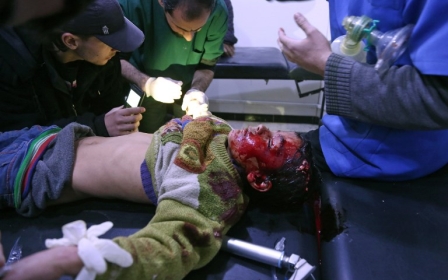UN Security Council unanimously backs Syria ceasefire

With Russia's backing, the UN Security Council on Saturday unanimously backed a 30-day ceasefire in Syria to allow for humanitarian aid deliveries and medical evacuations as the death toll topped 500 people in the seven day bombing campaign.
The resolution demanding the ceasefire "without delay" was adopted as Syrian government forces pounded the rebel-held enclave of Eastern Ghouta.
The Syrian Observatory for Human Rights said warplanes struck Eastern Ghouta on Saturday evening, minutes after the UN Security Council adopted a resolution demanding a ceasefire.
The jets hit the town of Shifouniyeh in the rebel enclave, said the Britain-based monitoring group and two residents of the besieged suburbs near Damascus.
A surge of air strikes and shelling by the Syrian government and its allies has pounded Eastern Ghouta since Sunday night, in one of the fiercest air-assaults of the seven-year war, residents, rescuers and the monitor say.
"We accept that it might take a number of hours before it can all be fully implemented ... we just have to keep the pressure up, implementation is key now," Swedish Foreign Minister Margot Wallstrom told Reuters.
"We are late to respond to this crisis, very late," US Ambassador Nikki Haley told the council after the vote, accusing Russia of stalling it.
"As they dragged out the negotiation, the bombs from Assad's fighter jets continued to fall. In the three days it took us to adopt this resolution, how many mothers lost their kids to the bombing and shelling?" Haley told the council. "We are deeply skeptical that the [Syrian] regime will comply."
More than 500 people, including more than 120 children, have been killed in seven days of relentless air strikes in Eastern Ghouta, which UN Secretary-General Antonio Guterres described as "hell on earth".
The resolution demands a cessation of hostilities "without delay" throughout Syria to allow the "safe, unimpeded and sustained" deliveries of aid and evacuations of the sick and wounded.
To win Russia's approval, language specifying that the ceasefire would start 72 hours after the adoption of the draft was scrapped, replaced by "without delay," and the term "immediate" was also dropped in reference to the aid deliveries and evacuations.
Diplomats said they were confident that this would not open the door to postponing the ceasefire, as council members had made clear in negotiations that the truce must quickly come into force.
Guterres is to report to the council in 15 days on the ceasefire, diplomats said.
French President Emmanuel Macron and German Chancellor Angela Merkel will hold talks on Sunday with Russia's Vladimir Putin over implementing a UN ceasefire in Syria, France's presidency said.
The discussion will centre on the "implementation of this resolution and on the political roadmap needed to achieve lasting peace in Syria," it said.
In another concession to Russia, the resolution said the ceasefire will not apply to operations against the Islamic State (IS) group or al-Qaeda, along with "individuals, groups, undertakings and entities" associated with the terror groups.
Offensive against al-Qaeda
That would allow the Syrian government offensive to continue against al-Qaeda-linked militants in Idlib, the last province in Syria outside the control of Damascus.
The text demands the lifting of all sieges including in Eastern Ghouta, Yarmouk, Foua and Kefraya and orders all sides to "cease depriving civilians of food and medicine indispensable to their survival".
The two major rebel factions in Eastern Ghouta welcomed the UN resolution. In separate statements, Jaish al-Islam and Failaq al-Rahman pledged to protect aid convoys that come into the besieged enclave. They said they would commit to a truce, but would respond to any violation by the Syrian government and its allies.
Several previous ceasefire attempts have quickly unravelled during the multi-sided conflict, which has killed hundreds of thousands and forced 11 million people out of their homes.
New MEE newsletter: Jerusalem Dispatch
Sign up to get the latest insights and analysis on Israel-Palestine, alongside Turkey Unpacked and other MEE newsletters
Middle East Eye delivers independent and unrivalled coverage and analysis of the Middle East, North Africa and beyond. To learn more about republishing this content and the associated fees, please fill out this form. More about MEE can be found here.




